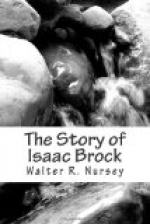Our hero’s trip from Long Point was full of peril and hardship. The lake shore in places was extremely rugged. Precipitous cliffs of red clay and sun-baked sand rose two hundred feet from the boulder-strewn coast. Scarcely a creek offered shelter. The weather was unusually stormy. A heavy surf boomed on the shore. Flocks of water-fowl were driven before the wind. The men were drenched by torrents of rain. Though thirty miles in twenty-four hours was considered the maximum distance for rowing a batteau, nothing could retard this strange armada or dampen the confidence of the men in their resolute leader, who in an open boat led the way. In this boat, which was “headquarters,” were Brock and his two aides. A lighted flambeau at the bow acted as a beacon during the night. After five days of great vigilance and galley-slave work, the toilers reached Amherstburg. Without the help of these hardy and resourceful men of the Canadian militia this trip could not have been accomplished.
The conduct of these bold frontiersmen aroused Brock’s admiration. His own example had again acted as an inspiration. Shortly after leaving Port Talbot, his batteau, pounding in the sea, ran upon a reef that extended far from shore, and despite oars and pike-poles, remained fast. In the height of the confusion “Master Isaac” sprang overboard, and a moment later voyageur and raw recruit, waist deep in water, following the example of the hero of Castle Cornet, lifted the batteau over the dangerous ledge.
When at midnight the boats passed up the Strait—through which the ambitious La Salle and Father Hennepin had passed in 1679—and grated on the gravel beach at Amherstburg, Brock was greeted with a volley of musketry by the Indians. This was contrary to his rigid rubric of war. Such waste of powder must not be tolerated. He turned to the Indian superintendent, “Do pray, Colonel Elliott,” said he, “explain my reasons for objecting to the firing and tell the Chiefs I will talk with them to-morrow.”
[Illustration: OUR HERO MEETS TECUMSEH. “THIS IS A MAN!”]
CHAPTER XVII.
OUR HERO MEETS TECUMSEH.
A few minutes only had elapsed when Elliott returned. The sentry’s challenge caused Brock to look up from the table, littered with plans and despatches. Another figure darkened the doorway.
“This, sir,” said Elliott, “is Tecumseh, the Shawanese chief of whom you have heard, and who desires to be presented to you.”
The General, who had removed the stains of travel and was in uniform, rose to his full height, bowed, extended his hand and explained in manly fashion the reason for asking that the firing be stopped. The contrast presented by the two men was striking. The old world and the new, face to face—a scene for the brush of an impressionist. Brock, tall, fair, big-limbed, a blue-eyed giant, imposing in scarlet coat and blue-white riding trousers, tasselled Hessian boots, and cocked-hat in hand. On his benevolent face was an irresistible smile.




